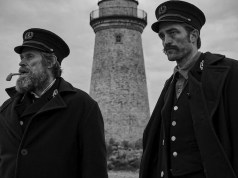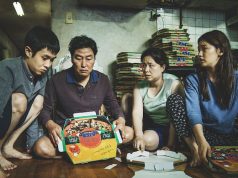In 2005, the highest-grossing foreign film in the U.S. was Stephen Chow’s “Kung Fu Hustle,” a martial arts action comedy that remains, to this day, one of the looniest and most inventive live-action treats I’ve seen. It was popular enough to inspire Miramax to re-release Chow’s previous film, “Shaolin Soccer,” which the distributor had dumped earlier, and which had a similar cartoonish sensibility.
I missed Chow’s next film, “CJ7,” a kids’ movie that played in the U.S. in 2008 to mixed reviews and poor box office (Stateside anyway; it did great in China and Hong Kong). But his latest, “Journey to the West: Conquering the Demons,” feels like a spiritual successor to both “CJ7” and “Kung Fu Hustle,” a fantasy story with kid-friendly elements but a decidedly darker sense of humor than Western kiddie flicks usually have. A loose reimagining of the classic Chinese novel, Chow’s Journey to the West is characteristically bug-eyed and silly, by turns creative, clever, and exhausting.
It begins with an idyllic scene that quickly turns quasi-horrific, as a little girl sees her fisherman father devoured by a giant river monster in full view of their small village. The bystanders’ reactions are exaggerated — we’re meant to be amused, not traumatized. The creature uses its stretchy tentacles to snatch more villagers from the docks (including a child!) before being subdued by a demon-hunter named Tang (Zhang Wen) and reverting to its true form of a skinny naked man. Rather than destroy the demon, Tang sings it a nursery rhyme to cleanse it of evil, but he’s interrupted by Miss Duan (Qi Shu), a fellow demon-hunter who uses more violent methods to capture the thing in her magic bag. And … the tone of the movie is set.
The rest of the story has Tang and Miss Duan working to defeat a handful of demons (including one in the form of a grotesque pig), their conflicting methodologies causing tension even as Miss Duan develops a powerful romantic attraction to Tang. We meet her crew, a circus-like group of vagabonds who live in the forest and travel in a chariot powered by their own breath. Demon-fighters with names like Prince Important and Almighty Foot (he has a tiny foot that can grow large to stomp on his enemies) join the ensemble. They search for the cave where the Monkey King has been imprisoned for 500 years. Eventually Buddha himself is involved in the epic battle.
Chow maintains a vigorously energetic pace throughout the film, as enthusiastic about the mystical martial-arts sequences as he is about the wacky bits in between. When we’re not engaged in one of the action scenes (which are assisted by unabashedly unconvincing computer animation), we’re treated to comedy sketches almost vaudevillian in their simple, relentless hamminess: Prince Important keeps accidentally calling himself “impotent” (I’d be curious to know how this joke works in Mandarin); Miss Duan tries any number of methods to woo Tang; etc.
Silliness can grow dull when it’s constantly cranked up to 11, and by the end the story seems to have spun off into irretrievable ridiculousness. Yet the film’s details are so marvelously playful that it’s hard not to smile at them. You can see Chow’s upbeat impishness in every corner, from the reanimated corpses with squeeze-toy heads to the Pig Demon’s pork-oriented family restaurant.
When it was released in China a year ago, the film set local records for best opening-day and single-day grosses. That doesn’t necessarily indicate quality (for a while North America’s record-holder for best opening day was Twilight: New Moon), but it does suggest a cultural connection that might not fully translate for Western viewers. Imaginative storytelling is pretty universal, though, no matter what language you speak.
B- (1 hr., 50 min.; Chinese with subtitles; )
Originally published at About.com.





